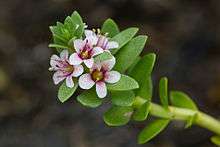Lysimachia maritima
Lysimachia maritima is a plant species belonging to the family Primulaceae. It was previously called Glaux maritima, the only species in the monotypic genus Glaux.[1] The species has a number of common names, including sea milkwort, sea milkweed, and black saltwort.
| Lysimachia maritima | |
|---|---|
 | |
| Scientific classification | |
| Kingdom: | Plantae |
| Clade: | Tracheophytes |
| Clade: | Angiosperms |
| Clade: | Eudicots |
| Clade: | Asterids |
| Order: | Ericales |
| Family: | Primulaceae |
| Genus: | Lysimachia |
| Species: | L. maritima |
| Binomial name | |
| Lysimachia maritima (L.) Galasso, Banfi & Soldano | |
| Synonyms[1] | |
| |
Distribution
Lysimachia maritima has a circumpolar distribution in the northern hemisphere and is native to Europe, central Asia and North America.[2] The species grows mainly in coastal habitats in Europe but also occurs in mesic interior habitats in Asia and North America, in both wet ground and water. It is known from alkaline meadows in desert regions in Utah, at elevations of up to 2600 m (8500 ft).[3]
Description
This plant differs from all other genera of the Primulaceae in having apetalous flowers with a pink, petaloid calyx. It is generally pentamerous both in the calyx and the seed capsule. The leaves are fleshy, simple and opposite.[4]
References
- "Lysimachia maritima". Germplasm Resources Information Network (GRIN). Agricultural Research Service (ARS), United States Department of Agriculture (USDA). Retrieved 2016-04-14.
- Anderberg, Arne. "Glaux maritima L." Den Virtuella Floran. Stockholm, Sweden: Naturhistoriska riksmuseet.
- Cholewa, Anita F. (1992). "Primulaceae primrose family". Journal of the Arizona-Nevada Academy of Science. 26 (1): 17–21. JSTOR 40026795.
- Stace, C. A. (2010). New Flora of the British Isles (Third ed.). Cambridge, UK: Cambridge University Press. p. 519. ISBN 9780521707725.
External links
| Wikimedia Commons has media related to Lysimachia maritima. |